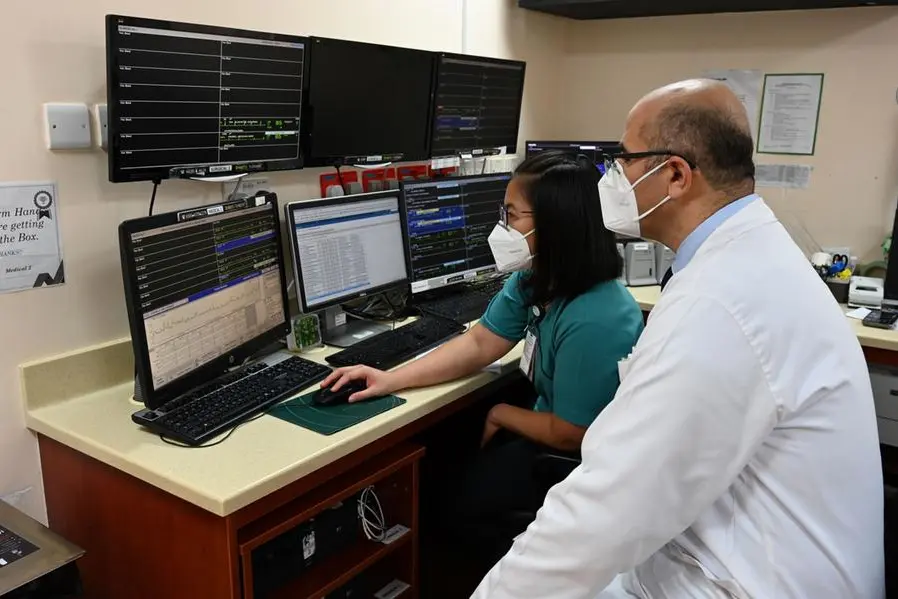PHOTO
Abu Dhabi: Abu Dhabi Health Services Company (SEHA), the UAE’s largest healthcare network, is sharing how Tawam Hospital doctors have saved the lives of 600 stroke patients in 2021 owing to their medical expertise and the hospital’s state of the art technologies. The patients received treatment in Tawam Hospital’s emergency department after suffering strokes that left them in a critical condition.
One case included a 42-year-old male patient who was rushed to their emergency department due to a suspected stroke, showing symptoms of slurred speech, and weakness in the right side of his body.
Upon his arrival to emergency department (ED), the patient, MD Islam, went through a comprehensive check-up where the attending ED physician determined that he was displaying symptoms of a stroke. He was taken for CT brain and CT angiography (a type of scan used to check blood vessels) scans on his head and neck to confirm the suspected disease. Doctors had then determined that the patient had suffered a Brain Stem Stroke due to obstructed blood supply to the brain stem and promptly received thrombolytic therapy - the use of drugs to break up or dissolve blood clots. He was then admitted to the stroke unit for monitoring.
The patient’s case was referred to a team of multidisciplinary doctors at Tawam Hospital consisting of consultants, specialists, stroke nurses, a speech therapist, a nutritionist, and a rehabilitation expert to closely monitor his progress and treat him. He was administered a complete course of blood clotting treatment which abated his symptoms and completely restored his full strength within 30 minutes of receiving the treatment.
Dr. Ali Hassan, Consultant Neurologist, at Tawam Hospital, confirmed: “Advances in medical and radiological procedures have positively contributed to the recovery and treatment outcome of stroke patients. The sooner a stroke patient is treated after the onset of symptoms, the more effectively they can recover. Patients who arrive at the hospital within approximately three and half hours from the onset of stroke symptoms have the best chances to fully or near fully recover.”
He added: “In the event of a major blockage in the blood vessels, an interventional radiologist is involved to immediately remove the clot, in accordance with the approved international protocols. Tawam Hospital houses an experienced team of interventional radiology consultants working alongside a highly qualified multidisciplinary team to deal with strokes and manage them comprehensively. This in turn leads to drastic changes in the patient’s condition and translates into positive outcomes and recovery.”
Dr. Wa'ed Ali Sumairi, Internal Medicine Resident at Tawam Hospital, said: “I am proud to be a member of the specialized medical team that dealt with the case of the 42-year-old male brain stem stroke patient. It was a rich learning experience for me since I was presented with the opportunity to assist in the patient’s clot removal treatment that resulted in positive results within 30 minutes of the patient’s arrival at the hospital. I would like to express my gratitude to SEHA and to Tawam Hospital in particular for giving medical residents the chance to be a part of such experienced multidisciplinary medical teams that develop and manage patient treatment plans to help improve patient lives.”
A stroke is a medical emergency, and the longer someone having a stroke waits to get treatment, the higher the chance of permanent damage or even death. Know what signs to look for by remembering the ‘B.E.F.A.S.T.’ steps, listed below:
B: Balance. Does the patient have loss of balance or are they dizzy? Are they walking differently?
E: Eyes. Can the patient see out of both eyes well? Ask them if they have vision loss, or blurry or double vision.
F: Face. Does one side of their face look uneven or like it is drooping? Ask them if their face feels numb, and for them to smile and check if their smile is uneven.
A: Arm. Does one of their arms feel numb? Ask them to raise both arms and see if one arm drifts downward.
S: Speech. Is the patient’s speech hard to understand? Are they confused? Are they having trouble understanding you?
T: Time to call 998. If someone is showing any of these signs, call 998 right away.
If you would like to book an appointment at Tawam Hospital or at any of SEHA’s other medical centers and hospitals, please call 800 50 or visit our website www.seha.com.
About SEHA:
The Abu Dhabi Health Services Company PJSC–SEHA – is an independent, public joint stock company created to develop the curative activities of the public healthcare system in Abu Dhabi. The company owns and operates all the public hospitals and clinics of the Emirate of Abu Dhabi.
SEHA is part of ADQ, one of the region’s largest holding companies with a broad portfolio of major enterprises spanning key sectors of Abu Dhabi’s diversified economy.
SEHA is committed to continuous improvement of customer care to recognized international standards and providing the community with world-class healthcare. SEHA operates 14 hospitals with over 3,385 beds, 70 ambulatory care, family care and urgent care centers and 3 blood banks. Its facilities accommodate 117,162 inpatients annually and conduct 43,262 surgeries, as well as treating more than five million outpatients.
SEHA is one of the largest integrated healthcare providers in the Middle East with more than 14,000 doctors, nurses, ancillary care, and administrative personnel. Learn more at www.seha.ae




















